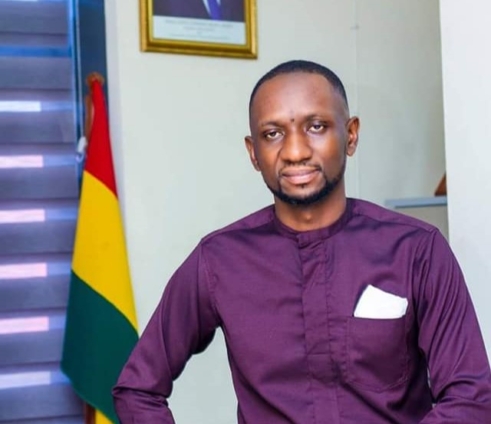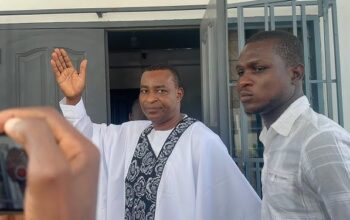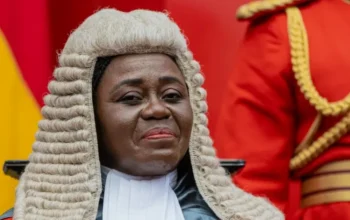In a Facebook post on Thursday, November 28, Kofi Ofosu Nkansah, the Chief Executive Officer of the National Entrepreneurship & Innovation Programme (NEIP), expressed his praise for President Akufo-Addo’s leadership in ensuring that the agenda 111 Hospitals project benefits every part of Ghana. Nkansah commended the President for his commitment to inclusive development, ensuring that the project reaches all districts across the country, rather than focusing solely on a few regions.
Nkansah contrasted President Akufo-Addo’s approach with that of former President John Dramani Mahama, suggesting that Mahama’s administration primarily concentrated on constructing large hospitals in Accra, leaving the other regions and districts underserved. He highlighted that Agenda 111, which aims to build 111 hospitals in various districts, is a major step in addressing healthcare inequalities and ensuring that the benefits of development are spread equally across the nation.
This comment from Nkansah underscores the NPP’s vision of delivering nationwide development and strengthening healthcare infrastructure in all corners of Ghana. He also highlighted the difference between the current government’s inclusive development strategy and what he perceived as Mahama’s less balanced approach in terms of healthcare infrastructure development. Kofi Ofosu Nkansah, the Chief Executive Officer of the National Entrepreneurship & Innovation Programme (NEIP), further emphasized that the Akufo-Addo government has shown a strong commitment to expanding healthcare facilities nationwide, with the agenda 111 hospitals project serving as a key milestone in Ghana’s infrastructure development.
Nkansah described Agenda 111 as a clear demonstration of President Akufo-Addo’s dedication to improving access to healthcare for all Ghanaians, regardless of their geographical location. He highlighted that this initiative goes beyond the construction of hospitals in major cities and ensures that even remote districts will benefit from modern healthcare facilities, addressing long-standing healthcare disparities in the country.
By investing in these healthcare facilities across the country, Nkansah argued, the Akufo-Addo administration is prioritizing the well-being of all citizens, with a focus on creating a more equitable healthcare system. This approach contrasts with previous administrations, which he claims had less focus on regions outside Accra. Through Agenda 111, Nkansah believes the government is ensuring that every Ghanaian, no matter where they live, has access to quality healthcare services, thus marking a significant step towards comprehensive national development.
In his Facebook post, Kofi Ofosu Nkansah, the Chief Executive Officer of the National Entrepreneurship & Innovation Programme (NEIP), highlighted the substantial progress made by the Akufo-Addo government in expanding healthcare infrastructure across the country. He noted that, since taking office, the government has already completed numerous hospitals as part of the agenda 111 initiative, with more facilities in the pipeline.
Nkansah further emphasized the strategic importance of these healthcare projects, pointing out that they not only improve access to healthcare but also help absorb excess liquidity in the economy, contributing to overall economic stability. This, he suggested, reflects the government’s broader approach to using infrastructure projects to stimulate economic growth and development.
Nkansah then addressed the comparison between President Akufo-Addo’s healthcare expansion and that of former President John Dramani Mahama, arguing that Mahama’s administration primarily focused on building three or four large hospitals in Greater Accra, with the University of Ghana Medical Centre (UGMC) being included, though Nkansah referred to it as a project from President Mills’ tenure. He argued that this focus on the capital city left many other regions underserved.
In contrast, Nkansah stressed that President Akufo-Addo has ensured that every district in Ghana is receiving a hospital under the agenda 111 initiative. He pointed out that, while some people might focus on the four large hospitals in Greater Accra, Akufo-Addo’s approach benefits the entire country. He concluded by asserting that the difference between the two administrations in terms of health infrastructure is “not even close”, underscoring the inclusive nature of the current government’s approach to development.
Kofi Ofosu Nkansah’s comments come at a time when the Akufo-Addo administration is actively promoting its achievements in the healthcare sector, particularly the agenda 111 hospitals project. The government has been highlighting its commitment to improving healthcare access across the country, with the agenda 111 initiative being a flagship project aimed at building hospitals in all districts.
However, while the government is celebrating its progress, it is also facing criticism from some quarters regarding the pace of construction and the distribution of healthcare facilities. Critics have raised concerns about delays in the completion of some hospitals and whether the locations of the facilities truly address the most urgent healthcare needs in every region.
Despite these challenges, Nkansah’s comments serve to defend the administration’s broader strategy and progress, particularly in the widespread distribution of healthcare facilities. He contrasts this with the previous government’s approach, arguing that the Akufo-Addo administration is more inclusive in its healthcare development, aiming to serve every district rather than focusing primarily on Accra.
Nkansah’s defence is likely part of the ongoing political discourse as Ghana prepares for the 2024 general elections, where issues such as healthcare infrastructure, economic stability, and governance are likely to play a central role in shaping voter opinions.
Kofi Ofosu Nkansah’s remarks come at a critical moment as the Akufo-Addo administration continues to face mixed reactions regarding its ambitious Agenda 111 hospitals project, a significant initiative aimed at building hospitals in all of Ghana’s districts. While the government has made strides in healthcare infrastructure, including the completion of several hospitals, there have been ongoing concerns and debates about the speed of construction and whether the distribution of these facilities truly addresses the diverse healthcare needs of the population.
Critics have pointed out delays in some of the Agenda 111 projects, arguing that many of the facilities have yet to be completed or are not functioning at full capacity. These delays have been compounded by concerns over resource allocation and whether the distribution of healthcare infrastructure is equitable across both urban and rural areas. Some people have expressed frustration over the perceived concentration of resources in certain regions, particularly in the Greater Accra area, which has traditionally seen more focus in terms of healthcare development.
In response to these criticisms, Nkansah framed the Agenda 111 initiative as a major step in addressing healthcare inequalities, asserting that unlike previous administrations, which concentrated their efforts mainly in Accra, the current government is prioritizing nationwide access to healthcare services. He emphasized that the Akufo-Addo administration is building hospitals in every district, aiming to provide healthcare closer to the people and ensuring that all regions benefit from the infrastructure.
Nkansah’s defence of the project is part of the broader political narrative that the Akufo-Addo administration has crafted around its development agenda. By highlighting the expansion of healthcare infrastructure as a key accomplishment, the government aims to show voters that it is delivering on its promises of nationwide development and economic recovery. This narrative contrasts with previous criticisms, particularly those aimed at the Mahama administration, which some have accused of focusing too much on a few large projects in urban areas, rather than addressing broader national needs.
While Agenda 111 is indeed a significant undertaking, critics argue that it is only one part of the healthcare conversation. Issues such as the availability of medical staff, medical supplies, and the overall quality of healthcare services are also critical factors in determining the effectiveness of this initiative. The challenge for the Akufo-Addo government will be to demonstrate that these new facilities are not only built but also equipped and staffed to provide quality care.
As Ghana approaches the 2024 elections, the debate surrounding healthcare will likely intensify. The Agenda 111 project is expected to play a prominent role in the political discourse, with both the New Patriotic Party (NPP) and the National Democratic Congress (NDC) using it as a focal point in their campaigns. The NPP will likely continue to highlight the expansion of healthcare infrastructure, while the NDC may focus on issues related to the speed of implementation and whether the project addresses the most pressing needs of the population.
Nkansah’s post reflects the broader sentiment within the NPP that the Akufo-Addo administration has been more effective in ensuring inclusive development, despite the challenges in execution and the ongoing critiques from various sections of the public. As the political landscape heats up, the ability to deliver on such ambitious projects while addressing criticisms will be a key test for the Akufo-Addo government in the final stretch of its term.









